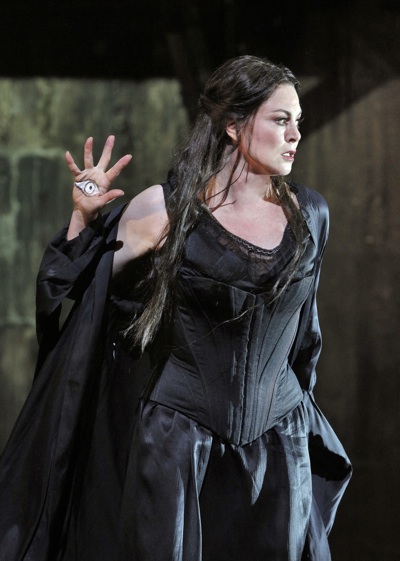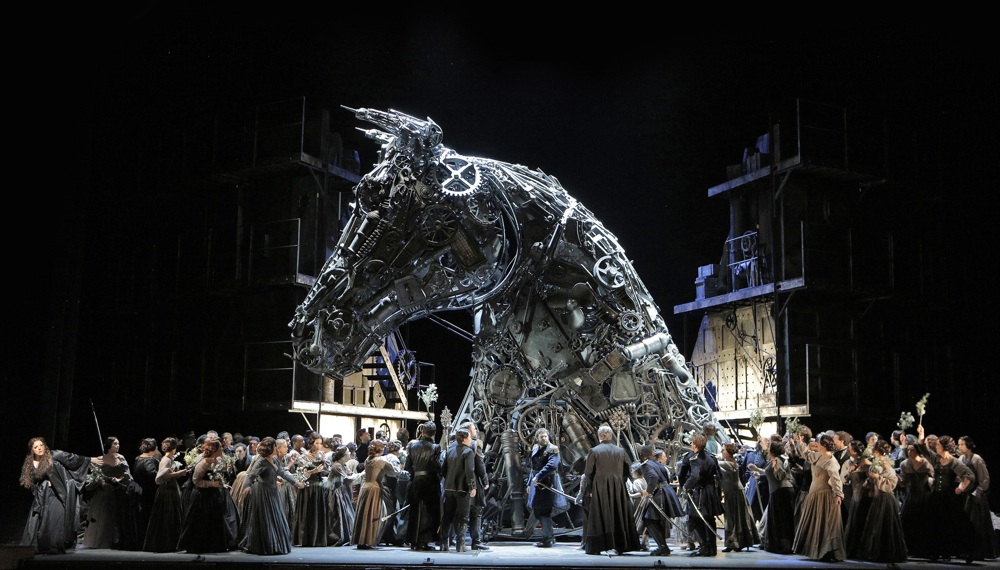The flames of war and the flames of love…
The San Francisco Opera turned in a triumphant spectacle last Thursday with Hector Berlioz’ epic Les Troyens, a five hour opera based on the Trojan Wars and the wandering of Aeneas. This huge production required 134 artists onstage including principal singers, chorus, dancers, acrobats and supernumeraries, along with 95 musicians packed into the pit and off-stage. The sets, constructed in England, were so massive at 32 tons that the Opera House stage floor had to be reinforced.
And those sets! English artist Es Devlin created a marvel of mystique and innuendo out of the detritus of war. The walls of Troy were a curving facade of acid-washed grays and bronzes, with 90 chorus members packed onto its four stories wearing strangely appropriate uniforms and dresses from the era of the Crimean War. The Trojan Horse was a crazy-quilt of Euro-minimalism, skeletal and robotic and full of spears and gears – and on fire!
 Carthage was a dream of peace, tawny with the golden sands of Moorish architecture, brilliantly colored costumes and peopled with farmers and fevered dancers.
Carthage was a dream of peace, tawny with the golden sands of Moorish architecture, brilliantly colored costumes and peopled with farmers and fevered dancers.
It was, in fact, too much for one opera house to manage, but was a magnificent co-production of the SF Opera, the Vienna State Opera, Milan’s La Scala, and England’s Royal Opera.
The real triumph wasn’t the woo-woo factor, as crazy as that was. It was the taut conducting of Donald Runnicles in his return to the SF Opera, where he conducted for 17 years and led an extraordinary Ring cycle in 2011. The SF Opera Orchestra, which works solidly under the baton of their regular conductor, Nicola Luisotti, ran a marathon for Runnicles.
Berlioz was more a master of mood and orchestration than of memorable melodies, and these musicians crafted his mercurial atmospheres from hushed chromatics to the trumpets of war.
Beyond Berlioz’ grand music and the stunning sets, what propelled this into gripping art was the formidable cast, anchored by Susan Graham as Dido, the Queen of Carthage, and Anna Caterina Antonacci as the mad prophetess, Cassandra.
The vocal depth of these two world-class singers was enhanced by their immersive acting, with Graham’s royal carriage and girlish heartbreak and Antonacci’s supple movements and bloody visions.
Based on Vergil’s account of the fall of Troy and of Aeneas’ wooing of Dido, the opera opened on the eve of Troy’s ruin as they welcomed a Greek gift – the Trojan horse – into their city. Antonacci sang the demanding role of Cassandra, a princess of Troy and a prophetess of Athena who is doomed to never be believed. A famed Italian soprano who rarely performs here (and is simultaneously starring in the SF Opera’s Two Women), her high tessitura and deep belly notes fleshed out a character not just of madness but of the loves and fears that propel it.
Her runs and wails are magnificent and hair-raising as she foresees the burning of her city and the death of her people. And then she softens. “Unhappy king! It is decreed that you shall descend into eternal night.” It is a vision of the death of her father. She ends that aria whispering the name of her own betrothed.
Embraced by the bewitching music, the emotions were jagged, from the revelry of the crowds to the sobs of Cassandra, from the kiss of lovers to the clash of arms and the screams of children.
After those two fiery acts come what could have been a completely separate opera, three more acts on the escape of the Trojan warriors and their wanderings to North Africa, where Aeneas bespells Dido, the Queen of Carthage.
Susan Graham was a force of nature in the role of Dido, all Queenly grace (and she is, after all, one of the reigning Divas of American opera), and the soft madness of first love. Her duet with Aeneas, “Nuit d’ivresse et d’extase infinie” (night of intoxication and infinite ecstasy), was a chiaroscuro of bright vowels and dark, all in silvered French (deservedly the language of love), and supported by Berlioz’ careful insistence of flute and oboe and horn.
Aeneas is a long and demanding role sung last Thursday by Corey Bix, who filled in for an ailing Bryan Hymel. Although Hymel’s tenor has a superb clarity, Bix was a sturdy replacement. He shone in that love duet and in his solo after telling Dido that he must leave her to fulfill the Gods’ decree, singing, “I cannot forget the deathly pallor… her heavy silence, the dark fire in her glazed eyes.”
That is also very French!
The unusually high caliber of the other soloists had two standouts: Sasha Cooke performed with a chocolaty mezzo that was lush and mesmerizing – and all one could ask for in her duets with Graham – and René Barbera brought down the house in his solo, employing a tenor of exquisite sweetness.
Weaving through the production was an entire dance troupe, with choreography by Lynne Page and Gemma Payne that melded classicism, eroticism, the abrupt isolations of dub step, and the furious sensuality of the stag. In the love duet, dancers formed the entwined petals of a flower around the royal duo, writhing in blushing sensuality.
Berlioz’ vision was of Shakespearean dimensions, an opera of two powerful women and two forms of insanity – a madness born of the unbearable weight of the future, and the rash madness of love. Both end badly, but no spoilers here, because after moving next year to Vienna, it is quite possible that SF will bring it back, hoping to retain a rare cast – the sets may be obtainable, but not those voices. This would be a twice-in-a-lifetime event.
Leaving tragedy for a comedy of love, the SF Opera will simulcast Mozart’s Marriage of Figaro from the stage of the War Memorial Opera House to the Giants’ AT&T Ballpark. This event is free and popular, held this year on July 3, so plan to go early! More information (and registration for early entrance) on their website, at sfopera.com.
—Adam Broner
Photo top of Anna Caterina Antonacci as Cassandra, and below, of the cast and the Horse! Both photos by Cory Weaver.

